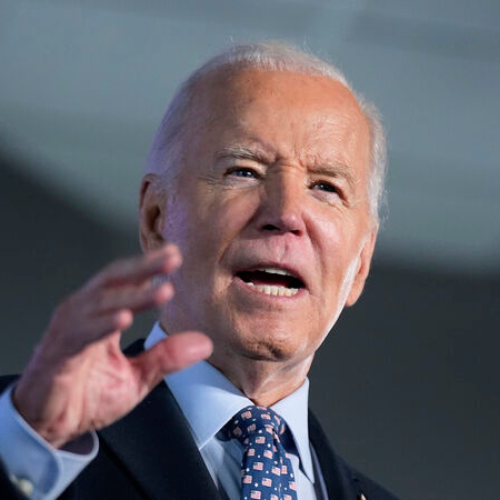Nearly 90 Democratic lawmakers are urging U.S. President Joe Biden to impose sanctions on certain Israeli government officials, accusing them of encouraging anti-Palestinian violence in the West Bank. These members of Congress are concerned about rising violence from Israeli settlers against Palestinians, ongoing settlement expansion, and actions that they believe destabilize the region. A letter they sent to Biden’s administration outlines these concerns and suggests that sanctions could send a strong message from the U.S. to its allies and partners worldwide.
Concerns Over Settler Violence and Growing Instability
The Democratic members of Congress, which include 17 senators and 71 representatives, say they’re worried about recent spikes in settler violence in the West Bank, which has resulted in increased attacks on Palestinian residents. According to the letter, there have been over 1,270 recorded attacks by settlers against Palestinians, averaging more than three violent incidents each day.
The letter, dated October 29 but made public on Thursday, specifically names Israeli Finance Minister Bezalel Smotrich and National Security Minister Itamar Ben-Gvir as officials who have allegedly incited some of this violence. Both Smotrich and Ben-Gvir are part of the cabinet under Israeli Prime Minister Benjamin Netanyahu. Members of Congress leading this effort, including Democratic Senator Chris Van Hollen and Representatives Rosa DeLauro and Sean Casten, argue that the U.S. needs to take a strong stance to discourage any actions that may promote hostility or undermine the peace in the region.
The lawmakers have also expressed deep concerns about Israel’s recent actions, which, they say, have weakened the Palestinian Authority and further destabilized the West Bank. This area is seen by many as a critical part of any future peaceful solution between Israel and Palestine, and many of these U.S. lawmakers feel that the current Israeli government’s actions pose a threat to that possibility.
The Case for Sanctions and Biden’s Authority
In their letter, the Democratic lawmakers urge Biden to consider using his authority under an existing executive order to impose sanctions on the Israeli officials involved. According to Senator Van Hollen and Representatives DeLauro and Casten, these sanctions would serve as a signal that the U.S. does not support or approve of any government, including its ally Israel, taking extreme actions that can lead to increased violence or human rights issues.
The proposed sanctions would not only be directed at Israel and the Palestinians but would also send a broader message to other U.S. allies around the world. The lawmakers believe that taking this action would reinforce the United States’ commitment to human rights and peace. “We think it’s more important than ever that President Biden right now states that the United States is not going to be a rubber stamp to the Netanyahu government’s extreme actions,” Van Hollen said.
France Plans New Sanctions on Israeli Settlers for West Bank Violence
There has been no response from the White House on this matter yet, according to three members of Congress who have been actively involved in this letter campaign. Spokespeople for both the White House and the Israeli embassy have not provided comments either.
Background: The West Bank and a Longstanding Dispute
The West Bank is one of several territories Israel captured in the 1967 Middle East war. Palestinians, with the backing of the international community, view this area as an essential part of their bid for statehood, envisioning it as part of an eventual independent Palestine. Most countries worldwide consider Israeli settlements in the West Bank to be illegal under international law. Israel, however, disputes this viewpoint, citing historical ties to the region and describing the settlements as a necessary security measure.
Historically, the U.S. has backed a “two-state solution,” which seeks to establish an independent Palestinian state alongside Israel. But as Israeli settlements continue to expand, many feel this solution is becoming harder to achieve. U.S. lawmakers argue that unchecked expansion and settler violence only deepen the conflict and erode trust, making it harder to reach a peaceful resolution.
In recent weeks, Israeli Finance Minister Smotrich, who also holds a defense ministry position responsible for oversight in the West Bank, said he hopes Israel will extend its sovereignty over the area as early as 2025. He expressed a desire to work with the incoming Trump administration to gain U.S. support for this action, a move that could further complicate U.S.-Israel relations if it contradicts the longstanding U.S. policy favoring a two-state solution.
The recent reelection of former U.S. President Donald Trump has added a new dynamic to this issue. Trump, known for his strong support for Netanyahu during his previous term, was seen as a powerful ally for Israel in his administration. Trump’s administration made several policy moves considered beneficial for Israel, including relocating the U.S. embassy to Jerusalem and recognizing Israel’s sovereignty over the Golan Heights.
With these developments, lawmakers are urging President Biden to clarify that the U.S. does not endorse the current Israeli government’s policies in the West Bank, including settlement expansion and settler violence, which many feel are in direct opposition to achieving a fair and lasting peace between Israelis and Palestinians.


